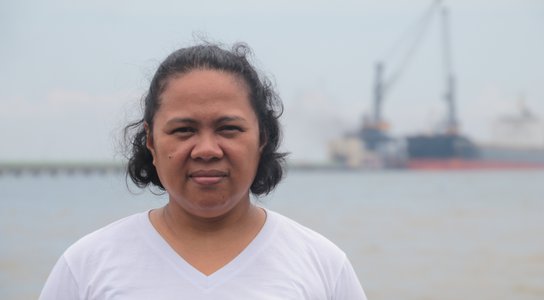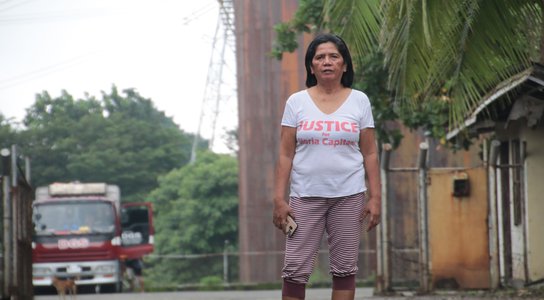Seven years ago, anti-coal activist Gloria Capitan was brutally murdered in front of her grandchildren by two gunmen. With her killers yet to be convicted, justice remains elusive. However, efforts to protect our universal right to a clean, healthy and safe environment continues.
I first met Ate Gloria in 2014, when she invited me to her home to talk about the increasing pollution and health problems within her community in Mariveles – a small coastal town in Manila Bay. She was an emphatic and a warm-hearted woman, who welcomed me with food, coffee and stories about community life. Her biggest complaint was the pollution, which she believed came from a nearby open coal storage facility operated by Seafront Shipyard and Port Terminal Services Corporation. The dust she described seemed to be the cause of respiratory issues and skin allergies suffered by her grandchildren and others in her community. She often told me that seeing her grandchildren have asthma attacks broke her heart.
‘Acute respiratory infection’ was the number one cause of death in Gloria’s hometown between 2010 and 2016 – the year she was killed. The black dust she described also led to the closure of her roadside store - depriving her of her source of income. This is what drove her to speak out.
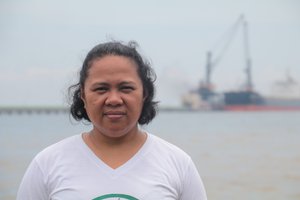
Veronica 'Derek' Cabe - Co-ordinator of the Nuclear and Coal-Free Bataan Movement
Ate Gloria was a feisty and passionate activist, but foremost she was just a loving grandmother who strived to protect her family’s wellbeing. - Veronica 'Derek' Cabe - Co-ordinator of the Nuclear and Coal-Free Bataan Movement
Determined to address the problem, Ate Gloria talked to her neighbours, and started a local petition against the operation of the open coal storage facility. She claimed that Seafront did not have the right permits for its coal-storage operation and that the company was operating illegally – an accusation backed up by the municipal health office. Alongside her fellow community members, she joined the Coal-Free Bataan Movement. Her petition grew with nearly 2000 people signing it, including members of the local government.
But as her campaign gained traction, Ate Gloria and other members of the local movement began to receive threats and said that they felt intimidated. Community members who signed the petition were allegedly threatened. Ate Gloria herself alleged that she received bribes and been told her home was being watched. Intimidation and vilification of other anti-coal activists within our movement were also reported.
Ate Gloria was instrumental in the campaign’s success against the dirty fossil businesses operating in the province. As a leading community defender, her efforts to organise the communities hosting these dirty businesses through the Coal-Free Bataan Movement, was a huge contribution in building grassroots action against coal and dirty energy in Bataan.
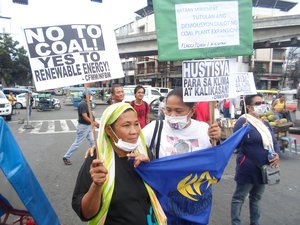
Ate Gloria and Derek Cabe march for climate justice in Manila, Philippines.
Our struggle has grown into a larger Philippines climate movement – which alongside Ate Gloria – submitted a petition to the Commission on Human Rights (CHR) in the Philippines in 2015, calling for global corporations, and some of the world’s largest carbon emitters, to be held responsible for resulting human rights violations resulting from climate change. Last year, the CHR published its findings, concluding that the biggest carbon polluters should be held liable for their contributions to climate change within the Philippines. By linking climate and human rights, the CHR’s findings lays the groundwork for future legal action to ensure that companies are held responsible for harms caused as a result of climate change.
Later that year, we joined a climate march in Manila. I remember that Ate Gloria felt proud because she didn’t imagine that a small community-based organisation could be part of a campaign that sought the responsibility of huge corporations. As we marched through the streets, she turned to me and told me how happy she was that a grandmother like her was still able to be part of the global movement marching for climate justice. She was hopeful for a better future.
Indeed, Ate Gloria’s optimism brought hope to the campaign and to the organisation – especially as we entered the 2016 elections. But that year, she became the first environmental defender to be killed under the former government led by President Duterte. Many more have since been permanently silenced.
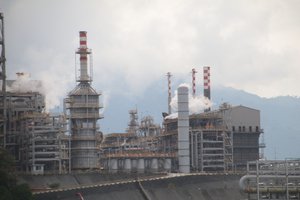
"We are best placed to talk about the effects of development projects on our lives, and through this inquiry can play a greater role in promoting new models that protect our rights and the welfare of the environment." - Veronica 'Derek' Cabe
Seven years later the call for justice continues - and is taking a new shape
The Coal Free Bataan Movement continues to work with communities impacted by the coal industry in the Philippines – calling for investors stop funding dirty energy projects. In 2017, we were one of 13 petitioners to file a complaint at the Compliance Advisor Ombudsman (CAO) – the independent complaints and accountability mechanism of the International Financial Corporation (IFC) – highlighting its indirect investment into 19 coal power stations across the Bataan region. The complaint alleged lack of consultation around the projects and also presented allegations of pollution, displacement of local people and impacts on health and the environment. The CAO's investigation reviewed 10 of the coal-fired power plants they financed in the Philippines, and 1 plant it committed to finance.
Impacted communities are seeking full and fair redress for all the harms and losses they have suffered, in line with the IFC policy requirements on social and environmental sustainability.
After years of waiting, in 2022, we welcomed news that the IFC will no longer allow financial intermediary clients to support new coal plants. The development bank also approved a Management Action Plan in response to the findings of the CAO investigation and contained four areas of improvement including assessing and addressing the environmental and social impacts associated with the named power plants, addressing emissions and improving the environmental and social risk management of its clients. Now, the complainant communities are already preparing for a visit and investigation by IFC over the next two months.
The decision has brought hope to the communities in Bataan, the continued search for accountability of corporations is acknowledged, and the loss and suffering is recognised. Our work is not yet over. This initiative is still part of the continued efforts of communities to push back against corporations in defence of their human rights and the fight for climate justice.
Ate Gloria may not be with us anymore, but her spirit and legacy lives on among us. The quest for justice continues.
Author
-
Veronica 'Derek' Cabe
Co-ordinator, Nuclear and Coal-Free Bataan Movement
